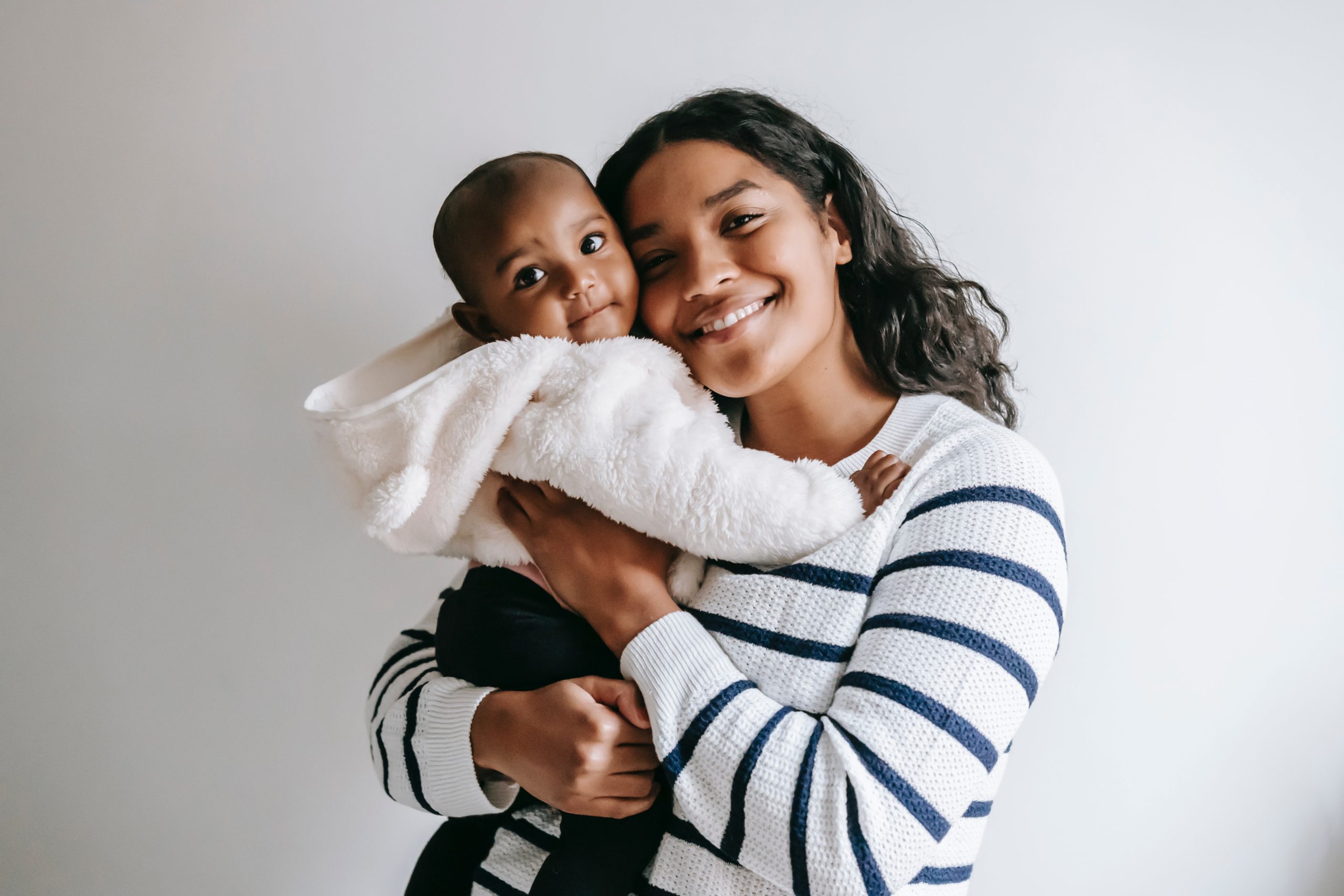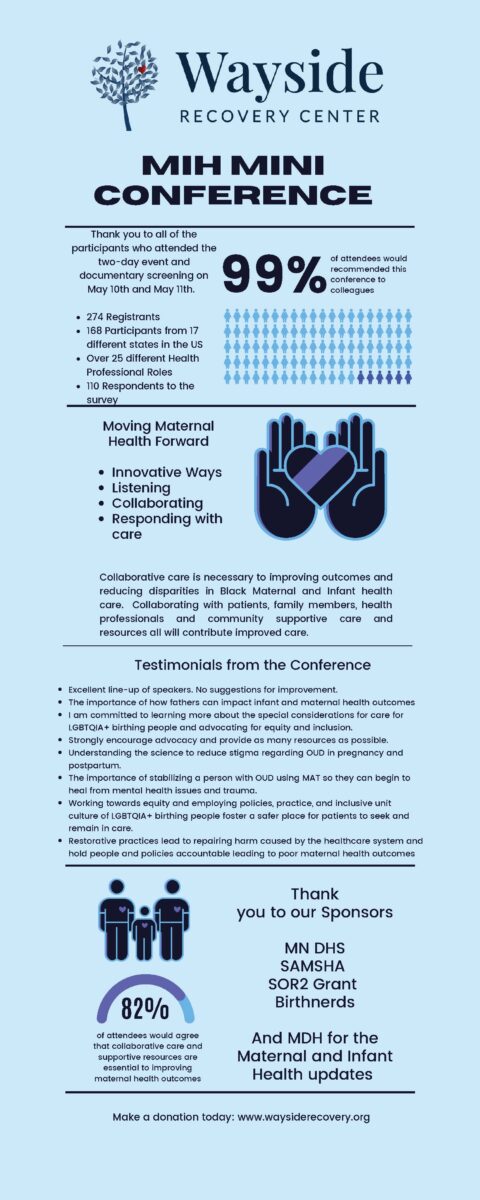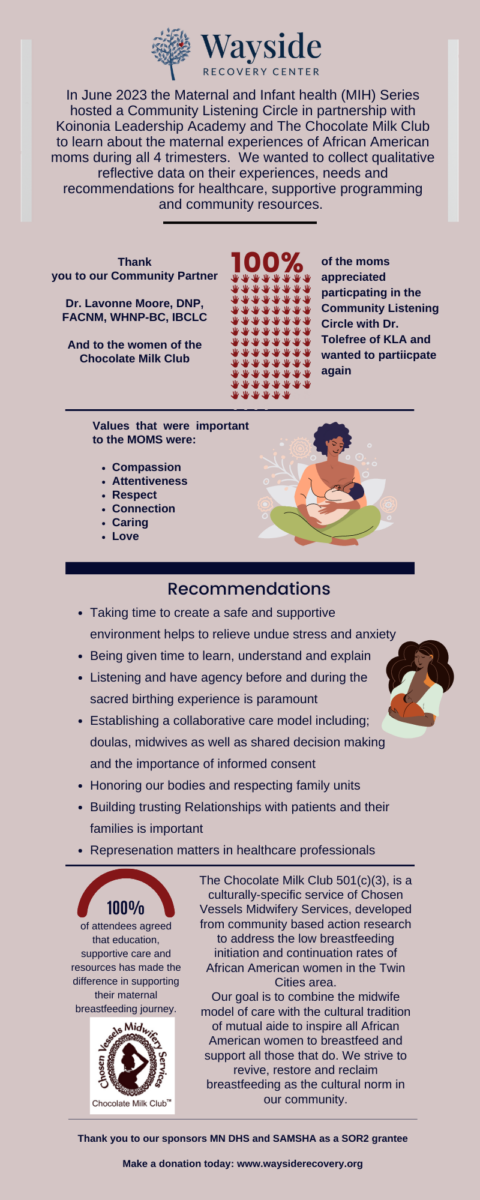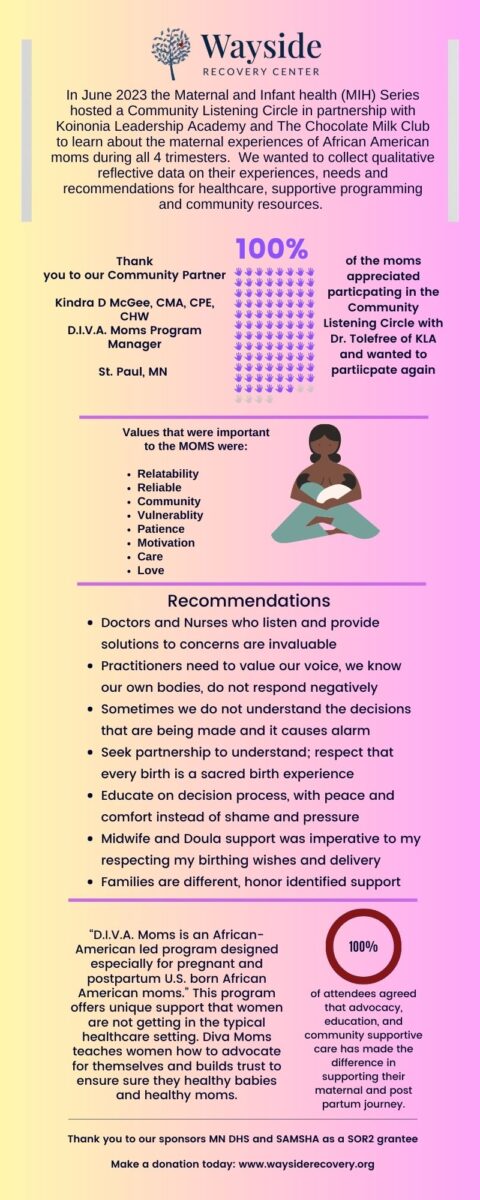
Reducing Maternal and Infant Health Disparities
Creating better service, practice and outcomes for healthy Black moms and babies
In America, Black women are 3-4 times more likely to experience a pregnancy-related death than white women. The U.S. has the highest maternal and infant mortality rate among comparable countries.
How wayside is addressing maternal health disparities
Wayside Recovery Center understands that the maternal and infant mortality crisis cannot be adequately addressed without understanding and dismantling racism and bias in our medical and behavioral health systems. We also understand that the complexities of the crisis require community-based responses. This means not only addressing the stigma associated with substance use disorders and mental illness, but also recognizing the inequalities that persist across the behavioral health system.
We owe it to the women and families we serve to play an active role in addressing healthcare gaps.
With support from the Minnesota Department of Human Services (DHS), Wayside is hosting a free public education Project ECHO series that focuses on fostering collaboration between patients, community and health practitioners to deliver high-quality care to Black mothers, infants and their families.
Funded fully through the State Opioid Response (SOR) grant from the Substance Abuse and Mental Health Services Administration (SAMHSA) and the Minnesota Department of Human Services (MN DHS). Nothing in these materials constitutes a direct or indirect endorsement by SAMHSA or the MN DHS of content, services or policies.
To receive regular invites about future events in this series, sign up online.
Register for Upcoming Events

We are currently on pause! The MIH ECHO Series will resume in May 2024. Sign up for MIH emails or check back here for upcoming event information in May.
Watch Past Events
Maternal Infant Health - Community Based Doula Program Model
Jacqueline Lambert
Equity in the NICU: Empowering BIPOC Families for Healthier Beginnings
with Dr. Jess Daigle
"This gives me so much power:" Shared Decision-making for Routine Labor Induction and its Impact on Pregnant People and Providers
with Ann Peralta, MPH, DrPH
Making Postpartum Personal: The Power of the 4th Trimester Care in Home
with Jessica Daigle, MD, FAAP, CEO and Founder of Mom and Me LLC
Reproductive Grief Care and the Fourth Trimester
with Angelica Quezada, MSW, LCSW, R-PLC, Director of Mental Health Programs at the Institute of Reproductive Grief Care
Childbirth Education: An Underutilized Tool in Transforming the Landscape of Maternity Care
with Jill Woodnick, MA, LCCE, IMH
Postpartum is Forever: Connecting Mind and Body to the Journey of Parenting, Part 2
with Dr. Ananeicia Williams, Clinical Therapist and Founder of Momtology Maternal Wellness Club, and Ms. Shanice Nelson, DSW, PMH-C
Watch Part 1 of the series here.
Healing Through Art - Artist and Birthworker
with Ms. Lauren Turner
From the Ashes (not recorded)
with Theresa Fortune
Selfcare is not Selfish
with Kindra McGee, CMA, CPE, CHW
Postpartum is Forever: Centering my Mind for the Journey of Parenting: Part 1
with Dr. Ana'Neicia Williams, Momology Maternal Wellness Club, Founder, Clinical Therapist
MIH "GREAT MOMs Model of Care- Changing Health System Management Through Advocacy"
with Cara Poland, MD, M.Ed, FACP, DFASAM
Equitable Data Science for Maternal Health
with Senan Ebrahim, MD, PhD
Mentoring Maternal Infant Health Sessions (not recorded)
with Dr. LaVonne Moore, DNP, CNM, IBCLC
Black Women and Maternal Health Inequities: Addressing the Role of Racism
with Dr. Ndidiamaka Amutah-Onukagha, PhD, MPH, CHES
Improving Maternal Outcomes through Evidence Based Digital Community Spaces
with Layo George, BSN, MHSA
Integrating Reproductive Justice within Maternal Mental Health
with Ana'Neicia Williams, LCSW, PMH-C
How Race-based Stress is Correlative to Maternal & Infant Mental Health for Culturally Marginalized Women and Children
with Dr. Cirecie West-Olatunji, PhD
Respect in Health Care: Human Right & Provider Obligation
with Leslie Farrington, MD
Polling Spotlight: Understanding the Experience of LGBTQ+ Birthing People
with Carla S. Alvarado, PhD. MPH
Maternal Infant Health - The (W)holistic Birth Experience
with Akilah Whitherspoon, BS, CPFSW, CD, (NBDA) CLC, LCCE
Maternal Infant Health - Partnering to Decrease Maternal Mortality
Dr. Corinne Brown Robinson, Dr. Domonique Jones and Rhonda Fellows
Leveraging Technology to Address Maternal Child Health Needs
Juliette Frazier, MPH
Providing Efficacious Communication of Pregnancy Loss and Reproductive Grief Care
Kathryn Grauerholz, MSN, MP, ACHPN, and Dr. Lauren Rubal, M.D. FACOG
Pregnancy After Loss Isn't Always Rainbows & Sunshine
Stephanie Crawford, M.Ed
Beyond the Birth: Patient-Centered Care in the Fourth Trimester
Ellen Jirik and Christian Minter
Helping Children Thrive: Addressing Health Disparities and Fostering Social-Emotional Development Among Youth in Foster Care
Katie J. Stone, PhD
Reproductive Grief Care: Comforting Those Who Mourn
Sara West, MS-PH, Certified Reproductive Grief Care Instructor
The Black Maternal Health Crisis and How Doulas Can Be a Part of the Solution
Tamara Mason, MPH, CHES
Catalyzing Racial Equity: Elevating Voices, Addressing Depression, Toxic Stress and Equity
Dr. Ebony Carter, Kelly McKay-Gist and Teneisha Parks
Culturally-Sensitive Perinatal Support During the Pandemic
Muna Bashir, MA-MCHS, CD (DONA), CCE (CAPPA)
Pregnancy, Food and Eating for Two
Dr. Sharan Rahman, MD, MBA, NCMP
Perinatal Substance Use & Reporting Laws
Dr. Cresta Jones, MD, FACOG
Opioid Use Disorder in Pregnancy: Beyond the Stigma to Evidence-Based Treatment
Amy E. Langenfeld, APRN, CNM, PMHNP-BC
Doulas Are So Much More
Shanika Clarke and Michelle Henderson
Fathers Are Not Born, They Are Made
Calvin Williams
Transgenerational Trauma
Dr. Cirecie West-Olatunji
Fathers and Perinatal Health
Calvin Williams
Expecting and Parenting Youth: An Exploration of Needs and Value Systems
Tamara Moore
Racism & ACES
Sameerah Bilal-Roby
Got Chocolate Milk? The Role of Culture in Breastfeeding
Dr. LaVonne Moore
Black Babies Matter
Dr. Rachel Hardeman
Mommas' Reproductive Justice & Police Violence
Dr. Rachel Hardeman
Prenatal Exposure to Substance Use Disorder
Dr. Judith Eckerle
Infant Health & COVID-19
Dr. Veronica Gillispie-Bell
Black Providers, Better Outcomes
Dr. Veronica Gillispie-Bell
The Role of OBGYNS in Advancing Perinatal Justice & Accountability
Dr. Karen Scott
Historical Perspectives on Black Maternal Health Disparities
Ruth Richardson
Addressing Racism as a Public Health Crisis
Dr. Camara Phyllis Jones
Results of our recent Moving Maternal Health Forward Conference



Funded fully through the State Opioid Response (SOR) grant from the Substance Abuse and Mental Health Services Administration (SAMHSA) and the Minnesota Department of Human Services (MN DHS). Nothing in these materials constitutes a direct or indirect endorsement by SAMHSA or the MN DHS of content, services, or policies.
